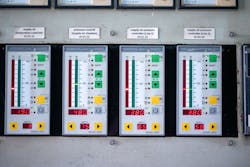How variable frequency drives enhance energy efficiency
AC induction motors are a cornerstone of industrial automation due to their durability and minimal maintenance requirements. However, their energy consumption can become inefficient when running continuously at full speed, regardless of load.
Variable frequency drives (VFDs) address this issue by regulating the frequency and voltage supplied to the motor, enabling precise speed and torque control to match load requirements, Automation World reported. This optimization significantly reduces energy waste and operational costs while extending motor lifespan through features like soft-start capabilities.
Read similar content: What is a variable frequency drive?
Advances such as regenerative VFDs, which recover energy during deceleration, and modular VFDs, which facilitate energy-sharing between motors, further enhance energy efficiency and adaptability in applications with dynamic load profiles.
Controls engineers building machinery for factories can leverage VFDs to improve energy efficiency and process performance across a wide range of applications. For instance, VFDs in pumps and fans deliver substantial energy savings by tailoring motor speed to load demands, while in material handling systems, they enable synchronized, efficient operation.
Learn more about VFDs in this article from Automation World, a Control Design partner publication.

